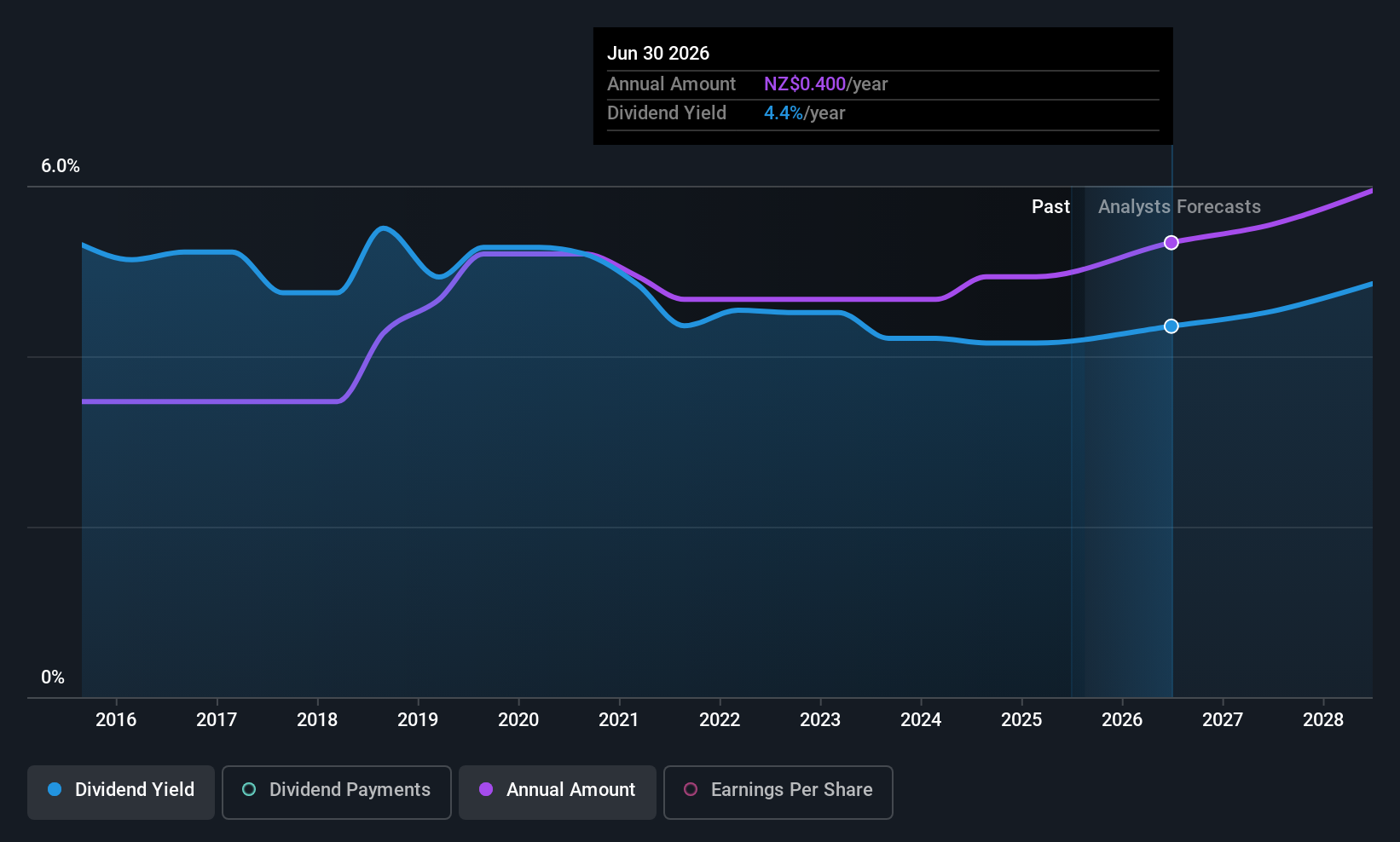Contact Energy Limited (NZSE:CEN) will pay a dividend of NZ$0.2529 on the 24th of September. This means that the annual payment will be 4.2% of the current stock price, which is in line with the average for the industry.
Contact Energy's Future Dividends May Potentially Be At Risk
We like a dividend to be consistent over the long term, so checking whether it is sustainable is important. Before making this announcement, Contact Energy was paying out quite a large proportion of both earnings and cash flow, with the dividend being 534% of cash flows. Paying out such a high proportion of cash flows certainly exposes the company to cutting the dividend if cash flows were to reduce.
Looking forward, earnings per share is forecast to fall by 1.6% over the next year. If the dividend continues along the path it has been on recently, the payout ratio in 12 months could be 138%, which is definitely a bit high to be sustainable going forward.

See our latest analysis for Contact Energy
Contact Energy Has A Solid Track Record
Even over a long history of paying dividends, the company's distributions have been remarkably stable. The dividend has gone from an annual total of NZ$0.26 in 2015 to the most recent total annual payment of NZ$0.39. This works out to be a compound annual growth rate (CAGR) of approximately 4.1% a year over that time. While the consistency in the dividend payments is impressive, we think the relatively slow rate of growth is less attractive.
Dividend Growth Could Be Constrained
The company's investors will be pleased to have been receiving dividend income for some time. Contact Energy has impressed us by growing EPS at 14% per year over the past five years. Past earnings growth has been decent, but unless this is one of those rare businesses that can grow without additional capital investment or marketing spend, we'd generally expect the higher payout ratio to limit its future growth prospects.
An additional note is that the company has been raising capital by issuing stock equal to 25% of shares outstanding in the last 12 months. Trying to grow the dividend when issuing new shares reminds us of the ancient Greek tale of Sisyphus - perpetually pushing a boulder uphill. Companies that consistently issue new shares are often suboptimal from a dividend perspective.
Our Thoughts On Contact Energy's Dividend
In summary, dividends being cut isn't ideal, however it can bring the payment into a more sustainable range. While the current distribution levels might be a bit unsustainable, we can't deny that until now it has been very stable. We don't think Contact Energy is a great stock to add to your portfolio if income is your focus.
It's important to note that companies having a consistent dividend policy will generate greater investor confidence than those having an erratic one. However, there are other things to consider for investors when analysing stock performance. Case in point: We've spotted 3 warning signs for Contact Energy (of which 1 is a bit concerning!) you should know about. If you are a dividend investor, you might also want to look at our curated list of high yield dividend stocks.
New: AI Stock Screener & Alerts
Our new AI Stock Screener scans the market every day to uncover opportunities.
• Dividend Powerhouses (3%+ Yield)
• Undervalued Small Caps with Insider Buying
• High growth Tech and AI Companies
Or build your own from over 50 metrics.
Have feedback on this article? Concerned about the content? Get in touch with us directly. Alternatively, email editorial-team (at) simplywallst.com.
This article by Simply Wall St is general in nature. We provide commentary based on historical data and analyst forecasts only using an unbiased methodology and our articles are not intended to be financial advice. It does not constitute a recommendation to buy or sell any stock, and does not take account of your objectives, or your financial situation. We aim to bring you long-term focused analysis driven by fundamental data. Note that our analysis may not factor in the latest price-sensitive company announcements or qualitative material. Simply Wall St has no position in any stocks mentioned.
About NZSE:CEN
Contact Energy
Generates and sells electricity and natural gas in New Zealand.
Solid track record with mediocre balance sheet.
Similar Companies
Market Insights
Community Narratives




